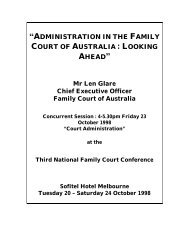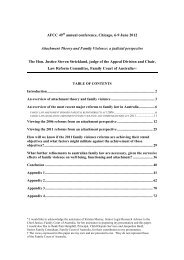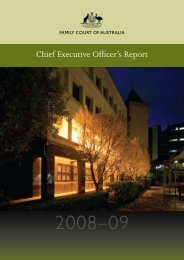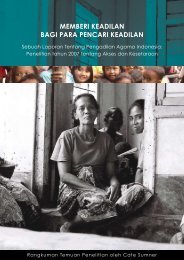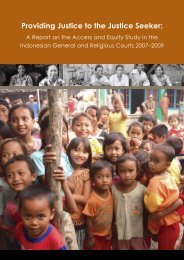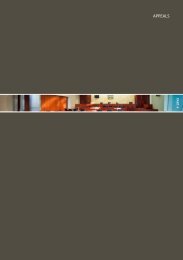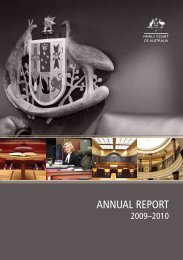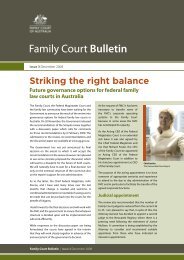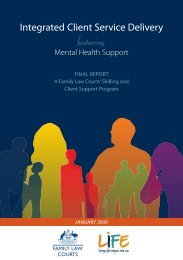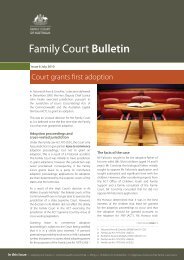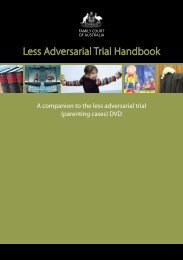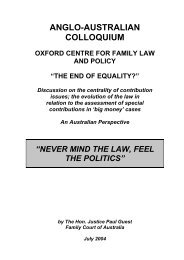Annual report [1997-98] - Family Court of Australia
Annual report [1997-98] - Family Court of Australia
Annual report [1997-98] - Family Court of Australia
Create successful ePaper yourself
Turn your PDF publications into a flip-book with our unique Google optimized e-Paper software.
The <strong>Family</strong> <strong>Court</strong> <strong>of</strong> <strong>Australia</strong> – annual <strong>report</strong> <strong>1997</strong>-<strong>98</strong><br />
should be based on solid evidence that those services could be improved by different<br />
administrative arrangements.<br />
‘To Have and to Hold’concentrated mainly on the methods available for supporting relationships<br />
and preventing their breakdown. It recognised that the <strong>Court</strong>’s services are, by<br />
necessity, directed at the acute needs <strong>of</strong> couples who have decided to separate, and that the<br />
focus <strong>of</strong> these is therefore different from the marriage and relationship counselling/therapy<br />
<strong>of</strong>fered by the community-based organisations. For this reason it recommended that the<br />
<strong>Court</strong>’s conciliation counselling services be re-named as separation counselling services.<br />
The <strong>report</strong> considered the <strong>Court</strong>’s PDR services to be an integral part <strong>of</strong> its operations and<br />
recommended that they remain a part <strong>of</strong> it.<br />
Judicial training<br />
Queenscliff seminar<br />
Anumber <strong>of</strong> judges and judicial registrars attended a training seminar in early April at<br />
Queenscliff in Victoria. The seminar enabled several newly appointed judges to participate<br />
in a forum at which papers were delivered on topics such as adversarial procedures, unrepresented<br />
litigants, gender awareness, simplified procedures and judgment writing.<br />
Cooktown workshop<br />
Those judges and judicial registrars who work in registries where there are likely to be<br />
indigenous customers were provided with training in Cooktown in late April 19<strong>98</strong>. One aim<br />
<strong>of</strong> the workshop was to promote the <strong>Court</strong>’s ongoing development <strong>of</strong> initiatives and strategies<br />
to assist Aboriginal and Torres Strait Islander people to access its services in a way that<br />
best meets their needs. Representatives <strong>of</strong> indigenous communities were able to meet with<br />
<strong>Court</strong> staff and discuss a range <strong>of</strong> issues related to families and to consider how the <strong>Court</strong>’s<br />
services and procedures may best be adapted to better service the needs <strong>of</strong> indigenous families<br />
and communities. With the appointment <strong>of</strong> two family consultants for Far North<br />
Queensland, the workshop also helped promote awareness <strong>of</strong> the consultants and their role.<br />
Delay reduction programs<br />
The <strong>Court</strong> is most concerned that delays in the settlement <strong>of</strong> final hearings have, if anything,<br />
increased over the year in review, particularly in Melbourne, Newcastle, Adelaide and<br />
Brisbane. This has occurred despite the efforts in a number <strong>of</strong> registries in both the northern<br />
and southern areas to reduce waiting times by running particular delay reduction programs.<br />
Such efforts are usually successful in the short term, but require a huge effort from already<br />
overworked judges and staff and a major injection <strong>of</strong> resources. Moreover, they can provide<br />
no more than ‘band aid’solutions to what is an inherent structural problem.<br />
The difficulties have been exacerbated by delays in the replacement <strong>of</strong> retiring judges and<br />
a failure by the Government to implement the <strong>Court</strong>’s proposal that part-time judges be<br />
appointed to cope with backlogs and periods <strong>of</strong> judicial illness and long leave. In the major<br />
registries an increasing volume <strong>of</strong> interim matters requiring determination can only be met<br />
by judges sitting in discrete duty lists, thereby compounding delays in the listing <strong>of</strong> final<br />
hearings. The <strong>Court</strong> has recently proposed that senior registrars be granted additional delegated<br />
powers in order to allow them to hear interim parenting applications.<br />
22


![Annual report [1997-98] - Family Court of Australia](https://img.yumpu.com/37244799/27/500x640/annual-report-1997-98-family-court-of-australia.jpg)
